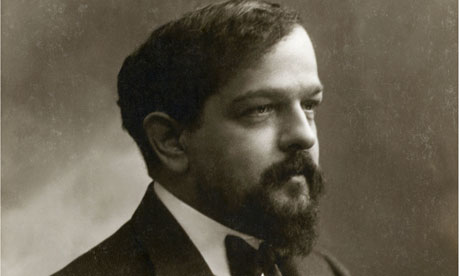
It's often said that music takes up where words end. As a pianist with a love of literature and the theatre, I have always been fascinated by the correlation between words and music, a passion that led to my creating performances that combined the two, in the form of "composer portrait" evenings. The first of these centred around the love-lives of the great Romantic composers Schumann, Chopin and Liszt, with actors reading from their letters and diaries. In performance I felt inspired by the interaction and the way in which words and music reflected each other.
These evenings gave us an insight into the private world of each composer and allowed the audience to experience not only the music but also the person behind it. I quickly discovered there was a huge appetite for this type of concert. And so last year, to commemorate the 150th anniversary of his death, I took on a new challenge in the form of Claude Debussy, whose words will be brought to life by actors including Henry Goodman, Alex Jennings, Samuel West, Brendan Coyle and Dominic West in a performance that I have called Rêverie.
An evening dedicated to a single composer can be complicated to present. Debussy himself once said that "six hours a day of rehearsal was enough to give you a dislike of any type of music, your own included". So I decided to do things a little differently and concentrated on producing a monologue given by an ailing Debussy, lying on his deathbed in Paris, and engulfed by the first world war.
Debussy was a highly complex personality who often suffered from depression. Two marriages, attempted suicides, secret trysts in Jersey and an incident with a revolver all formed part of his life. He was always chasing some elusive form of contentment. "I was a happiness addict," he declared. Which might explain his insatiable appetite for women (especially married ones), who seemed to be drawn to him too, although he was an unlikely Lothario, with his heavy-set features, thick beard and moody temperament.
Although I knew Debussy's music well, I now found myself immersed in his world. My narrative is taken not only from his letters and diaries, but also from other people's recollections of him. It is interspersed with some of his finest piano music. And there's certainly a vast amount of repertoire to choose from. Rêverie's music ranges from the salon-style First Arabesque to the brilliance of L'Isle Joyeuse (completed in 1904 while he was in Jersey with Emma Bardac, who was to become his wife four years later), and from the sublime nocturne Clair de Lune to the technically challenging Études.
Debussy writes perfectly for the piano. Everything works so well and feels comfortable to the hands. And, being a perfectionist, he notated every minute detail into the score. But this is also hugely challenging music. The Études, L'Isle Joyeuse, Estampes and many of the Preludes all require a virtuoso technique; he needs the performer to layer sounds, harmonies and chords in a way that no one had ever done before.
The greatest love of his life was his daughter, Claude-Emma, affectionately named Chouchou. The inspiration behind his famous Children's Corner suite, she could twist her adoring papa around her little finger. "Had it not been for her," he wrote, "I would have blown my brains out." Debussy was, in fact, to die of cancer at his home in the Bois de Boulogne when he was only 55. And in a cruel twist, Chouchou died of diptheria just a few months later. She was only 14 years old.
In creating Rêverie, I have discovered that the world thinks of Debussy as an "impressionist" composer, yet it was a term he himself loathed. He hated all labels. "There is no school of Debussy," he said. "I am I."
Lucy Parham and friends will perform Rêverie: The Life and Loves of Debussy at the Kings Place travel festival, London N1 on 22 June.

